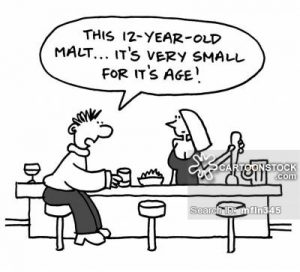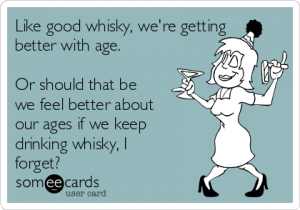What do you call it – whisky or water of life?
Mark Twain said “Too much of anything is bad, but too much good whiskey is barely enough.”
Yes, a lot of things have worked for people while sipping whisky: people have committed marriage, some great business deals have worked out, salesmen have had great sales across the table, and people have signed contracts …….. whisky is really charismatic.

The term ‘whisky’ derives originally from the Gaelic language (it is spoken mainly in the highlands and islands of western Scotland) ‘uisge beatha’, or ‘usquebaugh’, meaning ‘water of life’………and isn’t it apt? Whisky has been distilled in Scotland for hundreds of years. Alcohol has always influenced the mankind and had a great effect on the development of the human civilization. It seems the wine was produced and used over 8 thousand years ago and has infused itself into many religions and customs over the world. Whisky managed to became synonym of a Scottish history and one of the most popular modern alcoholic beverages. Although the national drink of the Scots gained worldwide popularity after 15th century, the origin of whisky can be traced to much older periods of our history.
Whisky is made via distillation of fermented grain and first records of that process was found in the archeological digs of millennia BC Babylon and Mesopotamia. Initially used for creation of perfumes and aromas, the distillation slowly spread across the ancient civilizations where it received numerous adaptations and improvements, finally finding its home behind the walls of the European Christian monasteries. Popularity of whisky continued to grew during the early years of 16th century, until 1541 when English King Henry VIII dissolved monasteries in Scotland. This event forced newly unemployed monks to start private production of whisky, and they soon spread their knowledge across entire Scotland.
Today, whisky is the topmost ranked alcohol in the world. Some like to gulp it while some sip it. It has numerous  varieties of brands: Crown Royal, Jim Beam, Canadian Club, Ballantine’s, Suntory, Chivas Regal, Johnnie Walker, Jack Daniel’s, McDowell, Officer’s Choice, Royal Stag, Bagpiper and Old Tavern. These are the top most brands, but there are many more brands…..about thousands of it. Some like it smooth while some like it hard, some like the blended while some like single malt. Life without Whisky is bristly. Well I am just trying to rhyme few lines in appreciation of whisky!!
varieties of brands: Crown Royal, Jim Beam, Canadian Club, Ballantine’s, Suntory, Chivas Regal, Johnnie Walker, Jack Daniel’s, McDowell, Officer’s Choice, Royal Stag, Bagpiper and Old Tavern. These are the top most brands, but there are many more brands…..about thousands of it. Some like it smooth while some like it hard, some like the blended while some like single malt. Life without Whisky is bristly. Well I am just trying to rhyme few lines in appreciation of whisky!!
No matter whatever your preference is: whether it is Jim Beam, Jack Daniels, Fireball, or Wild Turkey, there is no good or bad one…… yes that is the fact, believe. Each one has a favorite brand of his/her. The fact is that the demand for whiskey is overtaking the available supply over the past few years. Whiskey used to be the drink of cowboys, construction workers, and labor class workers. But, recently it has become more and more common to see people from all walks of life enjoying a shot of whiskey after work. In fact, doctors advise consumption (of course in moderation) of whisky every day.
It reduce the risk of blood clots, it lowers stroke and heart attack risk as well. The antioxidants in whiskey stop cholesterol from clogging arteries, and it can even boost the good cholesterol in blood. It is therefore considered as one of the best antioxidants. Some of the health benefits of whiskey include its ability to aid in weight loss, slow down the onset of dementia, increase heart health, prevents and manages diabetes, boosts good cholesterol, fights against cancer, strengthens the immune system. It fights stress, boosts memory, helps the digestion, lengthens life span, and is a great anti-diabetic. What more do you want?
There is a style of having whisky: pour little whiskey into a glass, glare at the color of it to gauge its age. Lift the glass to your nose for smelling its fragrance, pour in it little of clean water, taste the whiskey and compare it to its smell………add ice to a minimum. Finally, drink it however you like. Some people don’t like getting fussy about these things. Nor is getting scientific: anyone with a pipet adding water by the drop is kidding themselves.
to your nose for smelling its fragrance, pour in it little of clean water, taste the whiskey and compare it to its smell………add ice to a minimum. Finally, drink it however you like. Some people don’t like getting fussy about these things. Nor is getting scientific: anyone with a pipet adding water by the drop is kidding themselves.
Age of the whisky: If a bottle of Scotch whisky shows an age statement, e.g. “12 Years Old” means that the youngest whisky in the bottle is at least 12 years old. Scotch is bottled at a variety of ages, from 3 years to 50 years. Grain whisky is most often used between 3 and 5 years old in blended whisky brands. The drink is in demand at various other ages in blends: 5, 8, 12 years and older. Johnnie Walker Black Label and Chivas Regal 12 are both 12 year old blends whose combined case sales are over 10 million cases, or 10% of the total market. These two brands alone require high volumes of 12 year old grain whisky. For every batch of whisky, there are two major factors that determine how it would taste decades in future: what matters is the wooden barrel it’s aged in and the environment the barrel is stored in. Traditionally, whisky is aged in oak wood barrels that are either roasted or charred when they are built, creating a layer of charcoal that filters out the raw spirit’s unwanted flavors.
 Malt whisky is typically would be between 5 and 10 years old as malt matures more slowly than grain. 10% of malt is bottled as ‘single malt’, which means the product of a single distillery bottled without the addition of any other malt or grain whisky. The Age statements of whisky are from 10 to 20 years that are popular with consumers. In the recent times, there has been an increase in bottling of single malts which do not declare an age statement. Don’t bother too much about the age of whisky or your age – there is not right and wrong age, or no good or bad brand of the scotch…..three cheers to all whisky lovers out there!!!!
Malt whisky is typically would be between 5 and 10 years old as malt matures more slowly than grain. 10% of malt is bottled as ‘single malt’, which means the product of a single distillery bottled without the addition of any other malt or grain whisky. The Age statements of whisky are from 10 to 20 years that are popular with consumers. In the recent times, there has been an increase in bottling of single malts which do not declare an age statement. Don’t bother too much about the age of whisky or your age – there is not right and wrong age, or no good or bad brand of the scotch…..three cheers to all whisky lovers out there!!!!













































